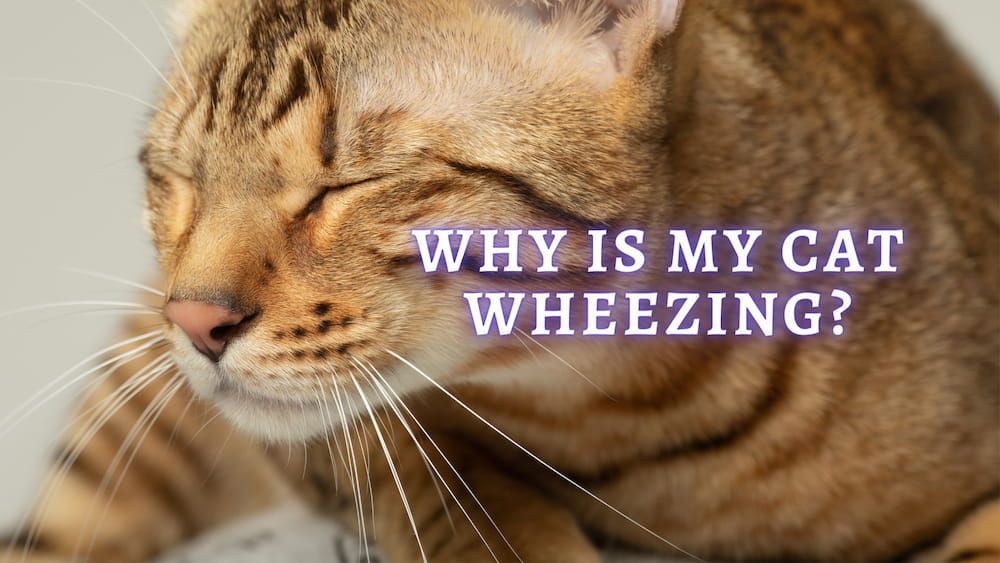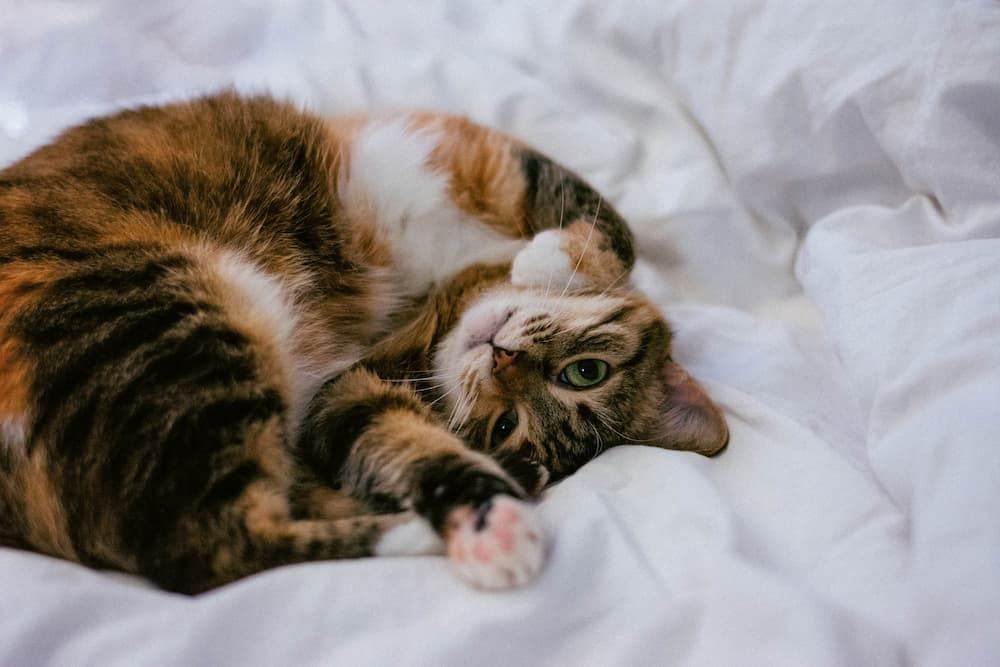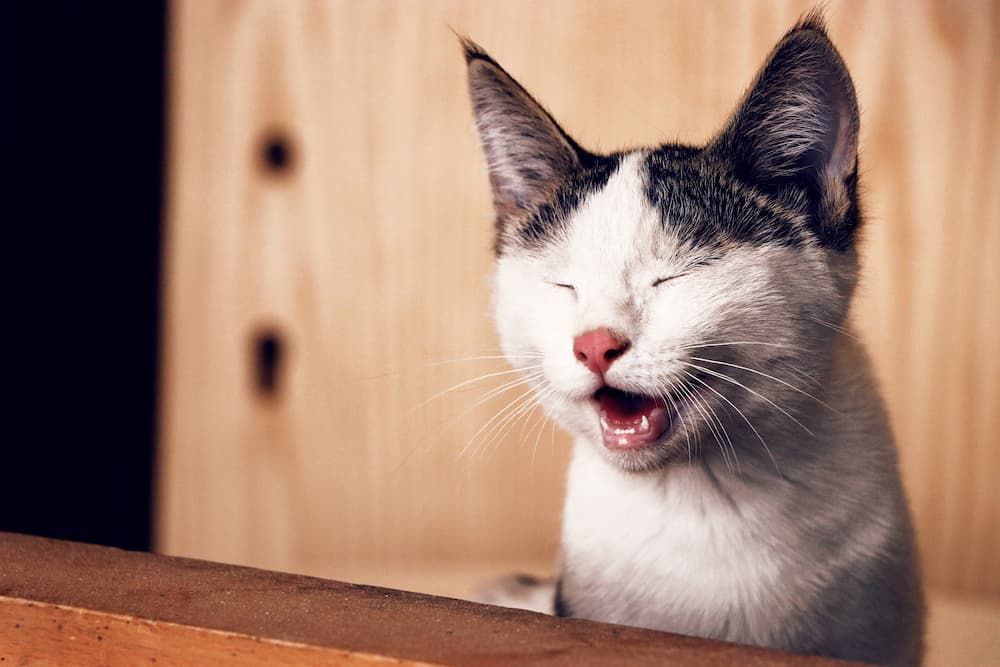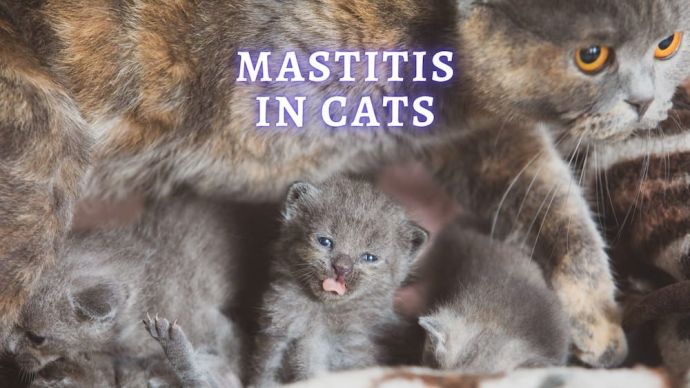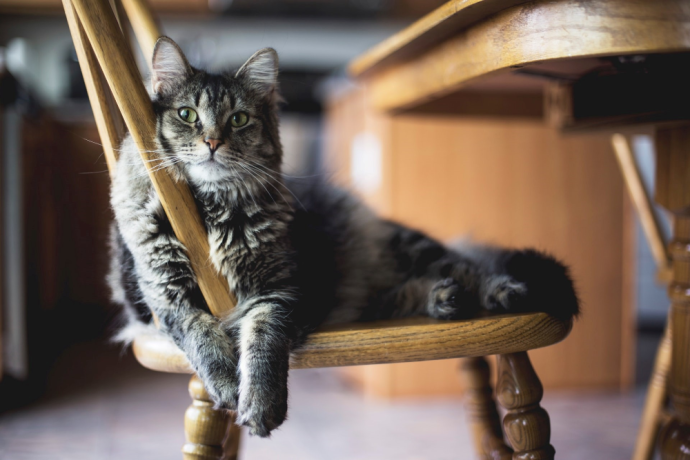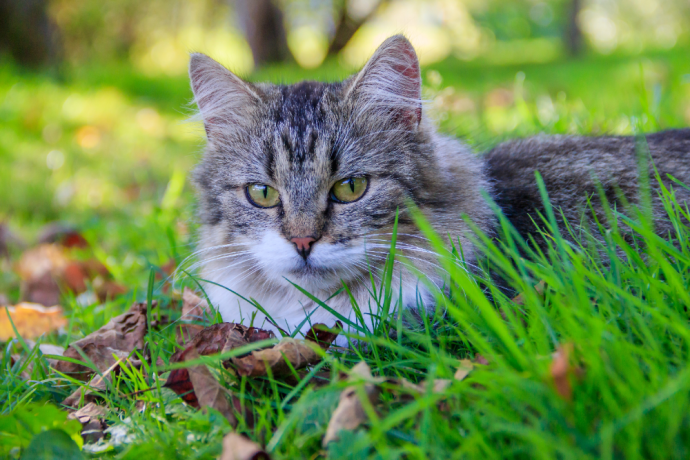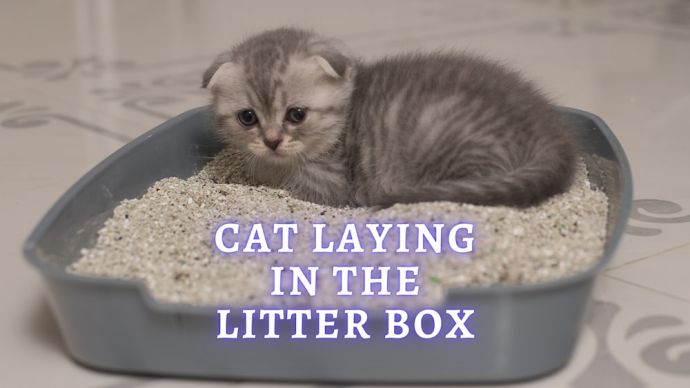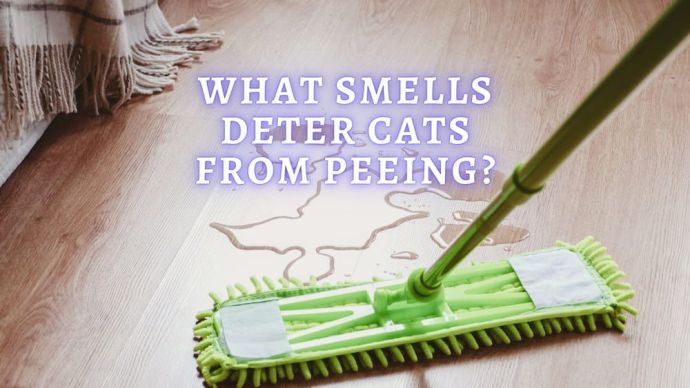Why Is My Cat Wheezing? 11 Reasons Why Cats Wheeze
Written by:
Author: Scott Jeffrey
Scott is a professional blogger with 12+ years of experience in writing, and holds an MA in anthropology. He has two cats as housemates. Also, Scott is passionate to research on pet-related topics such as dog training, puppy feeding, and cat health.
View all 63 articlesLearn about our editorial process and veterinary review board.
Reviewed by:
Veterinary review
by Dr. Chyrle Bonk
Dr. Chyrle Bonk is an associate veterinarian since 2010 and was a volunteer for Clearwater County Youth 4H. Dr. Bonk contributed to various animal and veterinary related websites and magazines as a way to help keep animals across the globe safe and healthy. When Chyrle not working she spends her time with her own furry crew of dogs, cats, and horses.
View all 10 articlesLearn about our veterinary review board
Viewed: 21683
Updated on: 04/19/2023
Hearing your cat wheezing or struggling to breathe not only alarming; it may also have you wondering what factors could potentially be causing the problem. Cat wheezing occurs due to a wide range of issues from asthma to allergies and even just age. Pinning down all the reasons is not always easy.
However, when you get to know the many factors that can cause cat wheezing, it can start to make sense for your cat and the case that you are experiencing. Before you go to the vet about your cat wheezing, it is essential to consider some of this complete information first.
What does Wheezing in Cats sound like?
A cat wheeze usually a raspy sound or something that is similar to a sneeze at times. Hearing that your kitty having labored breathing can often be a sign for concern, but it doesn’t always indicate a health concern that could be serious or life-threatening. Some wheezing may be periodical or short-lived, while other episodes can escalate into an emergency situation. Monitoring the progression of your cat’s wheezing can be important. If you notice the wheezing getting worse, it can often be a sign of something that is more serious happening.
Most cat wheezing usually sounds similar to human’s, and it can present as a whistling sound when they inhale and exhale or have a slight rattling in their breath. If you notice that there is heavy breathing, this can signify that your cat is having trouble getting the oxygen that they need for their health.
What Causes a Cat to Wheeze?
Cats can start wheezing due to a wide range of factors. Your kitty may have just coughed up a hairball, or they may start to wheeze when they have been sneezing for a while.
Wheezing, in general, can be caused by allergies to something as simple as your cat inhaling some dust. Here are some of the most common causes of wheezing that you can expect:
1. Asthma
Asthma is a very common condition, and many mammals can experience it regularly. If you notice that your cat is starting to have prolonged wheezing, there is a chance that they could be experiencing asthma.[1] If your cat regularly experiences some type of trouble with their breathing, it could be a sign that they may need some form of ongoing assistance with their breathing or some form of medication that can be used for treating their asthma. Inhalers can be given to cats just like humans. There are also a wealth of medications that may be tried to combat this form of wheezing.
2. Hairballs
Wheezing sounds can also accompany hairballs. As part of regular grooming, cats will catch hair in their tongues over time. The wheezing sound can often come when the hairball makes its way up the esophagus.
Your kitty might start to make a wheezing noise before they expel the hairball and before they start to gag or retch to get it up. If you notice that your cat has excessive wheezing after they pass the hairball, it could be an indication that they have a serious problem with hairballs, and they may need to seek out medication to cut down on them.
3. Allergies
Many animals can have allergies. If you have a kitty that suffers from allergies to pollen or mold, they will often wheeze. Your kitty can be irritated by cigarette smoke, respiratory issues, and more. Pay attention to your cat and what is happening with them. If you determine that your cat is allergic to something, make sure that they can get the proper allergy medication and avoid it so that they are not spending time wheezing.
4. Foreign Objects
Felines are curious, just like humans, and they will often try out foods and objects that they should not eat. If a kitty swallows an object, it could block the airway and be unable to move down into the stomach or come out of their mouth. The stuck object will block the airway, and this will often lead to the chance that your pet will have an ongoing problem with wheezing.
Clearing a foreign object is crucial for your pet’s health. Make sure you are keeping an eye on them and that if you notice your cat ingesting something that they shouldn’t, they can pass it quickly.
5. Stress
Kitties feel stress like a human does, and one way that stress manifests is by constriction of the airways, leading to a wheezing sound when they breathe. Issues with wheezing will change the state of your cat. Every kitty has a different trigger, and it is important to understand what makes your cat stressed. If you see that your cat is experiencing distress and wheezing simultaneously, this may be just a physiological reaction to the stress they are taking in. Making an effort to reduce the stress that your cat experiences will help to reduce the chance that your furry friend will experience wheezing and more.
6. Respiratory Infections
If your cat has developed a respiratory infection like a cold or flu, they will often wheeze. Felines can get sick just like a human does, and you will likely notice the wheezing pass over in just a few days. These infections are usually not serious, but if your pet is starting to look malnourished or they are having difficulty staying hydrated, you will need to go to the vet immediately.
7. Heartworms:
Heartworm is a parasite that takes root in the blood vessels of the lungs and the heart.
These creatures can cause a condition in cats called HARD or “heartworm-associated respiratory disease.” The issue with this disease is that it can cause a kitty to wheeze and cough. This condition is something that will get worse over time, so you must be keeping up on your doses of heartworm preventative and going to your vet if your kitty has been coughing and wheezing and experiencing a lack of appetite.
8. Polyps, Cancer And Other Growths
Cancer and other growths can form on the lungs and cause your cat to wheeze. Your vet may need to perform an x-ray to check for signs of growth and other concerns that could cause the function of your cat’s lungs to change. If your cat has cancer or some form of growth, it can be a very serious treatment plan that could include surgery, radiation, and more.
9. Parasites
Various parasites apart from heartworm also have a tendency to attack the heart and lungs. If you have a pet experiencing a parasite, there could be a chance that they will start to wheeze. A parasite is something that needs to be addressed with your vet and the use of an antiparasiticide.
READ MORE: Cat Deworming and What to Expect After It
10. Heart Failure And Other Diseases
Because the heart and lungs are so connected, heart failure or heart conditions will sometimes present in the form of wheezing as well. If you have a pet that is starting to experience heart failure, they may start to wheeze as their lungs and heart are taxed. Checking out your pet after they start to grunt more often can be an important step to preserving their health and monitoring their condition as it progresses.
11. Pneumonia
As fluid gathers in the lungs, there is also a chance that your cat might start to experience problems with wheezing. Pneumonia is a condition that occurs when there is fluid in the lungs. If this starts to occur, it can be difficult for your cat to breathe and retain oxygen in the lungs. Pneumonia is a serious condition, and it can often affect overall health and well-being if it is not treated quickly. If you notice your cat is struggling to breathe and coughing often, this could be the sign they are experiencing pneumonia.
Is my Cat Wheezing or Coughing?
The difference between wheezing or coughing can be hard to recognize. The easiest way to tell the difference is to get as close to your kitty as they feel comfortable and listen closely to their breath. Wheezing will be a more consistent form of breathing, where coughing will tend to come and go.
When should I be concerned about my Cats Wheezing?
If your cat has been wheezing over a long period of time, such as a few weeks, it may be a good time to take them in to get checked out. Even if they seem fine, the wheezing could be a sign of a seasonal allergy or asthma. If your cat stops taking food or seems dehydrated, this can often signify poorer health. You should be more concerned about wheezing during these times, and you should consider taking your pet to a vet.
Dr. Chyrle Bonk
What to do if your Cat is Wheezing?
If your cat is wheezing after a hairball or an isolated incident of wheezing, this is a chance that they just might need some more water or a way to pass the irritation they are experiencing. If the wheezing persists, you will need to monitor it to see if it worsens over time. If you notice that your cat has been wheezing for an extended amount of time or stressed by it, they need to go to the vet.
Treatment for Cat Wheezing
The treatment for wheezing in cats will vary depending on the conditions that they may have. Most of the time, for minor throat irritation, a cat will just need to pass a hairball or have more hydration to pass the wheezing moment. A cat might need to take medications to control conditions like allergies or asthma in more serious cases.
RELATED: Best Cat Food for Allergies (Vet Approved List)
Treating Cat asthma and respiratory Symptoms
If your cat has ongoing respiratory symptoms, there is a chance that they are likely to need some form of treatment. Treating respiratory conditions usually comes down to regular medication. In some cases for cat asthma, some puffers slide on over their snout and allow you to slowly puff medication into the chamber. These are usually reserved for cases of severe asthma, but they can be one of the most effective treatment options.
FAQs:
Why does my Cat wheeze and cough?
Cats can wheeze and cough to clear their airways or as a result of a variety of conditions. When there are irritants in the air, a cat will likely experience a need to clear their airway or even experience swelling of the airways causing wheezing. When it gets harder to breathe or when your kitty is affected by a condition like asthma and isn’t receiving the same oxygen supply, they may cough to try and get the oxygen flow going.
What should I do if my Cat is wheezing?
The best thing you can do if a cat is wheezing is give them a bit of space. Let them try to get rid of the hairball or irritation, and make sure that your kitty is able to try and clear out the wheezing on their own. If you notice that your kitty is starting to wheeze more often or over a prolonged period of time, there is a chance that they may need to go to the vet.
Is Cat wheezing serious?
In most cases, it is not, but if it persists over a long time, it is usually best to go to the vet to see what the issue with wheezing may be.
What does Cat asthma sound like?
Asthma in cats can sound the same as it does in humans. Your cat may gasp or wheeze due to a narrowing of the airways brought on by inflammation. If you suspect your feline friend is experiencing asthma, make sure that you get them checked out at the vet ASAP.
When should I worry about my Cat’s breathing?
If your cat is having a hairball or experiencing minor difficulty with breathing from time to time, you can likely watch them on an incident-by-incident basis. If you find that your cat is experiencing ongoing, intensely labored breathing, you need to consult a vet.
How do I know if my Cat has fluid in its lungs?
If your cat allows you to listen in to its lungs or get close enough to hear its breathing, you are likely to hear more of a gurgly wheeze when they are trying to breathe. If your kitty is extremely lethargic and has had a serious cold for some time, getting them checked out for pneumonia is important.
If you are interested in learning more about wheezing in cats or experiencing wheezing in your own pets, make sure that you follow up with your local veterinarian. Cat wheezing is usually only a mild cause for concern, but if it persists, it could be a serious issue for your pet!
What does Cat asthma sound like?
Some many sounds and signs distinguish cat asthma. First of all, a kitty with asthma may breathe through its mouth to get air in. They may also stretch their neck out for the same effect. They may also be less active and breathe more quickly. The normal respiratory rate for cats is 25-30 breaths per minute, while cats with asthma may take 40 or more breathes each minute.
Felines with asthma may also wheeze, both when at rest or following exercise. It will look like there is a tightness in their chest that makes it difficult to inhale air. They may also cough or retch, similar to when they are coughing up a hairball, as they try to clear their airways to make way for more air. If your cat is having a serious asthma attack, their lips and gums may start to turn blue due to lack of oxygen.
DVM Chyrle Bonk
Asthma is something that warrants a veterinary visit as it can be serious enough to cause severe distress or even death.
Article Sources:
- Corcoran, B. M., et al. “Feline Asthma Syndrome: A Retrospective Study of the Clinical Presentation in 29 Cats.” Wiley Online Library, onlinelibrary.wiley.com/doi/abs/10.1111/j.1748-5827.1995.tb02787.x.
- MacPhail, Catriona M. “Laryngeal Disease in Dogs and Cats: An Update.” ScienceDirect, sciencedirect.com/science/article/abs/pii/S0195561619301688.
 Cat Care Why Does My Cat Attack My Legs? 10 Reasons Why and What To Do About It (Vet-Approved Advice)
Cat Care Why Does My Cat Attack My Legs? 10 Reasons Why and What To Do About It (Vet-Approved Advice) - 45076
- 21
 Cat Veterinary Tips Cat Stomach Gurgling: Vet Advice on Why is Your Cat Stomach Gurgling?
Cat Veterinary Tips Cat Stomach Gurgling: Vet Advice on Why is Your Cat Stomach Gurgling? - 33726
- 4
 Cat Veterinary Tips My Cat Lost its Voice: Can Cats get Laryngitis? (Vet Advice)
Cat Veterinary Tips My Cat Lost its Voice: Can Cats get Laryngitis? (Vet Advice) - 22889
- 13
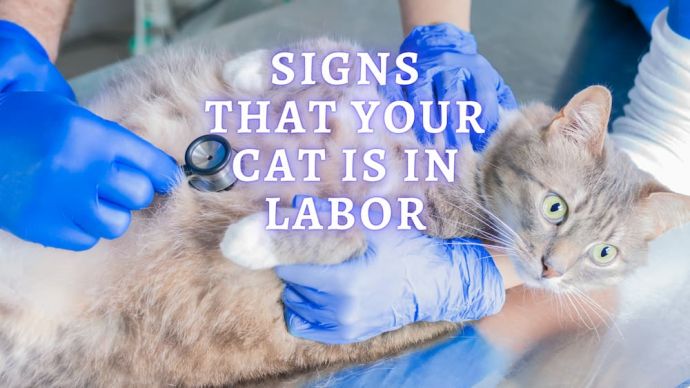 Cat Veterinary Tips Signs That Your Cat is in Labor: How to tell if a Cat is Pregnant?
Cat Veterinary Tips Signs That Your Cat is in Labor: How to tell if a Cat is Pregnant? - 13936
- 1









